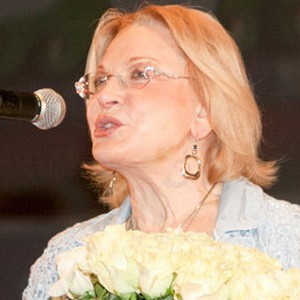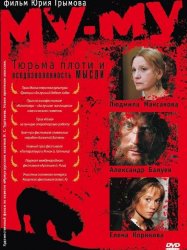Lyudmila Maksakova est une Actrice Russe née le 26 septembre 1940 à Moscou (Russie)

Lyudmila Maksakova (Russian: Людмила Васильевна Максакова; born 26 September 1940) is a Soviet theater and film actress. Maksakova, who appeared in 24 films between 1965 and 1998, was assignated People's Artist of Russia (1980); she is a laureate of the USSR State Prize (1995) and the prestigious Stanislavsky Prize (1996). She is the daughter of mezzo-soprano Maria Maksakova, Sr. and the mother of Maria Maksakova, Jr., an opera singer and Russian TV Kultura presenter.
For many years Lyudmila was unaware of her father's identity. By keeping it secret, her mother was protecting her from serious trouble at the time when any link to 'a traitor' could be regarded crime against the state; according to the family legend, her father might have been NKVD general Vasily Novikov (hence the middle name, Vasilienva). This controversy was also the reason for the atmosphere of secrecy that the girl has been grown in. With rumours spreading around concerning her origins (one had it that she'd been the daughter of none other than Stalin, who'd treated the famous Bolshoi singer as a favourite), Lyudmila was being kept mostly at home, so as "not to get too much unwanted impressions", as her mother put it. It was only in the Moscow Central music school where she studied cello that the girl would be able to socialize with peers.
After the graduation from both schools (the secondary and the musical) simultaneously, Lyudmila has opted against pursuing musical career and enrolled at the prestigious Schukin theater college, to study in the actor Vladimir Etush class. In 1961 she graduated from the College and joined the Vakhtangov Theater, the troupe she knew well, since she'd been performing with it already, while a student. The first two roles Maksakova was given there were as Masha Tchubukova in Kookie in Marriage (by Anatoly Sofronov) and as Masha in The Living Corpse (by Leo Tolstoy). Her breakthrough came two years later when she took upon herself the part of the Tatar princess Adelma in the famous Vakhtangov production of Princess Turandot, revived by director Ruben Simonov. This performance, full of swagger and charm, highlighted the young actress' best qualities and made her an overnight sensation in the Moscow theater circles. In the years to come she was lauded by theater critics in heroic parts (Lolya, Dion; Knipper-Chekhova, My Whimsical Happines), as well as comic (Nicol, Le Bourgeois gentilhomme), lyrical (Maria, The Cavalry Army after Babel) and dramatic (Mamayeva, Enough Stupidity in Every Wise Man) ones.
In 1964 Maksakova debuted on screen as Nina in Grigory Chukhray's There Was an Old Couple. Over the next ten years she had leading parts in revolutionary history drama Tatiana's Day (as Tatiana Ogneva, the young workers' leader), psychological melodrama Not Guilty (Natasha) and tragic melodrama The Bad Good Man (Nadezhda). The 1977 marriage to a German citizen Peter Igenbergs all but finished Maksakova's career: her photos have been removed from the press and life in theater became difficult, then collaborations with guesting theater directors from abroad (Miroslav Belovich, A. Kovalchik) saw its successful re-launch.
Praised were her leading parts in Roman Viktyuk's Anna Karenina 1983 production (based on Mikhail Roshchin's remake of Leo Tolstoy's classic) which was followed by The Lady Without Camellias (after Terence Rattigan's play, Paola), Soboryane (based on Leskov's novel, Bizyukina) and I Don't Know You From Now On, Dear (after Aldo De Benedetti's play, Louise). In 1990 Maksakova debuted as a co-director in Viktyuk's take on David Pawnell's The Master's Lessons staged at Vakhtangov's. Maksakova's notable film works of the were The Old Russian Vaudevilles' Evening (1979) where she played five women, Igor Talankin's drama Father Sergius (after Leo Tolstoy's short story, Makovkina) and Rosalinde in Die Fledermaus, the Ian Frid's musical film after Johann Strauss Strauss' classic where she starred opposite brothers Yuri and Vitaly Solomin.
Critics lauded her works in Stanislav Govorukhin's Ten Little Negroes (1987, as Miss Brent), Pyotr Todorovsky's By the Main Street with an Orchestra (1986, as Alla Maksimovna) and Pyotr Fomenko's melodrama Old Car Ridings (Zoya Pavlovna). The latter marked the beginning of successful collaboration the climax of which was the Alexander Ostrovsky's Guilty Without Fault production which earned Maksakova the "USSR State Prize" in 1995, and the Stanislavsky Prize a year later. Two other Fomenko productions, Queen of Spades (1998) and The Resurrection (1999, after Maurice Maeterlinck's Le Miracle de saint Antoine) starred Maksakova. In 2000s she started to teach at the Schukin's Theater College and her appearances on stage and on screen have become increasingly less frequent.
Source : Wikidata
Lyudmila Maksakova

Nom de naissance Lyudmila Vasilyevna Maksakova
Nationalité Russie
Naissance 26 septembre 1940 (84 ans) à Moscou (Russie)
Nationalité Russie
Naissance 26 septembre 1940 (84 ans) à Moscou (Russie)
Biographie
Lyudmila Maksakova was born in Moscow to opera diva Maria Maksakova and theater entrepreneur Aleksander Volkov, whom her mother never married and who, in 1942, defected to the West, later to re-surface in the United States as the founder of a drama school.For many years Lyudmila was unaware of her father's identity. By keeping it secret, her mother was protecting her from serious trouble at the time when any link to 'a traitor' could be regarded crime against the state; according to the family legend, her father might have been NKVD general Vasily Novikov (hence the middle name, Vasilienva). This controversy was also the reason for the atmosphere of secrecy that the girl has been grown in. With rumours spreading around concerning her origins (one had it that she'd been the daughter of none other than Stalin, who'd treated the famous Bolshoi singer as a favourite), Lyudmila was being kept mostly at home, so as "not to get too much unwanted impressions", as her mother put it. It was only in the Moscow Central music school where she studied cello that the girl would be able to socialize with peers.
After the graduation from both schools (the secondary and the musical) simultaneously, Lyudmila has opted against pursuing musical career and enrolled at the prestigious Schukin theater college, to study in the actor Vladimir Etush class. In 1961 she graduated from the College and joined the Vakhtangov Theater, the troupe she knew well, since she'd been performing with it already, while a student. The first two roles Maksakova was given there were as Masha Tchubukova in Kookie in Marriage (by Anatoly Sofronov) and as Masha in The Living Corpse (by Leo Tolstoy). Her breakthrough came two years later when she took upon herself the part of the Tatar princess Adelma in the famous Vakhtangov production of Princess Turandot, revived by director Ruben Simonov. This performance, full of swagger and charm, highlighted the young actress' best qualities and made her an overnight sensation in the Moscow theater circles. In the years to come she was lauded by theater critics in heroic parts (Lolya, Dion; Knipper-Chekhova, My Whimsical Happines), as well as comic (Nicol, Le Bourgeois gentilhomme), lyrical (Maria, The Cavalry Army after Babel) and dramatic (Mamayeva, Enough Stupidity in Every Wise Man) ones.
In 1964 Maksakova debuted on screen as Nina in Grigory Chukhray's There Was an Old Couple. Over the next ten years she had leading parts in revolutionary history drama Tatiana's Day (as Tatiana Ogneva, the young workers' leader), psychological melodrama Not Guilty (Natasha) and tragic melodrama The Bad Good Man (Nadezhda). The 1977 marriage to a German citizen Peter Igenbergs all but finished Maksakova's career: her photos have been removed from the press and life in theater became difficult, then collaborations with guesting theater directors from abroad (Miroslav Belovich, A. Kovalchik) saw its successful re-launch.
Praised were her leading parts in Roman Viktyuk's Anna Karenina 1983 production (based on Mikhail Roshchin's remake of Leo Tolstoy's classic) which was followed by The Lady Without Camellias (after Terence Rattigan's play, Paola), Soboryane (based on Leskov's novel, Bizyukina) and I Don't Know You From Now On, Dear (after Aldo De Benedetti's play, Louise). In 1990 Maksakova debuted as a co-director in Viktyuk's take on David Pawnell's The Master's Lessons staged at Vakhtangov's. Maksakova's notable film works of the were The Old Russian Vaudevilles' Evening (1979) where she played five women, Igor Talankin's drama Father Sergius (after Leo Tolstoy's short story, Makovkina) and Rosalinde in Die Fledermaus, the Ian Frid's musical film after Johann Strauss Strauss' classic where she starred opposite brothers Yuri and Vitaly Solomin.
Critics lauded her works in Stanislav Govorukhin's Ten Little Negroes (1987, as Miss Brent), Pyotr Todorovsky's By the Main Street with an Orchestra (1986, as Alla Maksimovna) and Pyotr Fomenko's melodrama Old Car Ridings (Zoya Pavlovna). The latter marked the beginning of successful collaboration the climax of which was the Alexander Ostrovsky's Guilty Without Fault production which earned Maksakova the "USSR State Prize" in 1995, and the Stanislavsky Prize a year later. Two other Fomenko productions, Queen of Spades (1998) and The Resurrection (1999, after Maurice Maeterlinck's Le Miracle de saint Antoine) starred Maksakova. In 2000s she started to teach at the Schukin's Theater College and her appearances on stage and on screen have become increasingly less frequent.
Le plus souvent avec
Filmographie de Lyudmila Maksakova (6 films)
Actrice

Attraction (2017)
, 2h12Réalisé par Fiodor Bondartchouk
Origine Russie
Genres Drame, Science-fiction, Aventure, Romance
Thèmes Dystopique, Extraterrestre
Acteurs Oleg Menshikov, Sergueï Garmach, Lyudmila Maksakova
Rôle Sofia
Note56%





L'histoire tourne autour du colonel de l'armée de terre russe Valentin Lebedev, responsable de l'opération militaire, de sa fille Yulia, qui tombe amoureuse de l'étranger Hariton, et de son ancien ami Tomas qui est le principal antagoniste.

Anna Karénine (2009)
Réalisé par Sergueï Soloviov
Genres Drame
Thèmes Le suicide
Acteurs Tatiaana Dorubitch, Oleg Yankovsky, Iaroslav Boïko, Sergueï Garmach, Aleksandr Abdulov, Lyudmila Maksakova
Note61%






Moumou (1998)
, 1h41Réalisé par Iouri Grymov
Origine Russie
Genres Drame
Thèmes Mise en scène d'un animal, Mise en scène d'un chien, Mise en scène d'un mammifère
Acteurs Aleksandr Baluev, Lyudmila Maksakova, Irina Apeksimova, Aleksei Kravchenko, Andrey Martynov, Yelena Zakharova
Rôle Mistress
Note52%






Dix Petits Nègres (1987)
, 2h17Réalisé par Stanislav Govoroukhine
Origine Russie
Genres Policier
Acteurs Vladimir Zeldin, Tatiaana Dorubitch, Aleksandr Abdulov, Lyudmila Maksakova, Alexandre Kaïdanovski, Anatoli Romashin
Rôle miss Emily Caroline Brent
Note77%





Ten complete strangers are invited to spend the weekend in a lonely mansion on an island off the English coast. Once there, they realize that none of them know their unseen host, who has identified himself only as "A. N. Owen." Using a prerecorded gramophone, Mr. Owen accuses them each of past murders that the law was unable to punish, and promises swift retribution. Soon thereafter the first guest dies, the victim of poisoning. The remaining guests come to realize that the killer is murdering them according to the old Ten Little Niggers nursery rhyme. When their attempt to locate Mr. Owen by searching the island proves fruitless, they realize that the unknown assailant is in fact one of them.

Le Père Serge (1978)
, 1h55Réalisé par Igor Talankine
Origine Russie
Genres Drame
Thèmes Religion
Acteurs Serge Bondartchouk, Valentina Titova, Vladislav Strzelczyk, Nikolai Gritsenko, Ivan Lapikov, Lyudmila Maksakova
Rôle Makovkina
Note61%





Le héros principal du film est le prince Stepan Kassatski, un jeune officier ardent et fier, un grand admirateur du tsar. La veille de son mariage il apprend que sa fiancée était la maîtresse du souverain. Profondément déçu, Kassatski prononce le vœu monastique et quitte la capitale. Il s'appelle désormais père Serge et mène une vie solitaire. Des rumeurs au sujet d'un ancien officier entré dans les ordres se rependent. Une belle femme dépravée tente de le séduire et il est obligé de se couper un doigt pour ne pas succomber à ses charmes. Acclamé par les fidèles il jouit d'une réputation qui s'étend bien au-delà des frontières de son canton. Il fait preuve de chasteté pendant des années. Mais il sera séduit par une fille simplette amenée chez lui pour une séances de prière de guérison.
 , 1h43
, 1h43Réalisé par Grigori Tchoukhraï
Origine Russie
Genres Drame
Acteurs Lyudmila Maksakova, Galina Polskikh, Georgy Martyniuk, Vera Kouznetsova, Nikolai Kryuchkov, Nikolay Khlibko
Rôle Nina
Note60%





Dans un village, près d'un fleuve, à la suite de l'incendie de leur maison, deux retraités se retrouvent sans abri. N'ayant ni la force ni l'envie de reconstruire une isba, ils choisissent de rejoindre leur fille qui habite dans le nord de la Sibérie, à Vorkouta, bien qu'un de leurs fils soit dans une meilleure situation. Ils apprennent que leur fille, mère d'un petit garçon, a quitté le foyer conjugal pour suivre un autre homme. Lorsqu'elle revient, outré par sa conduite, son père la chasse. Lui et son épouse vont donc cohabiter avec leur gendre alcoolique et leur petit-fils. Le grand-père imprégné de l'idéologie de la période stalinienne va découvrir sur place les conséquences de cette époque.
 Connexion
Connexion




